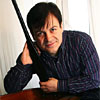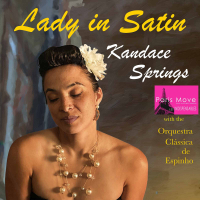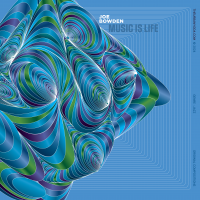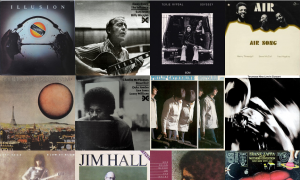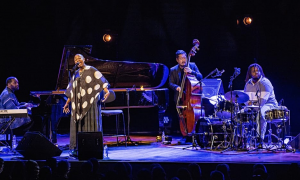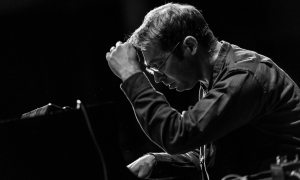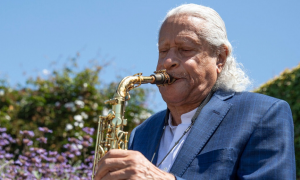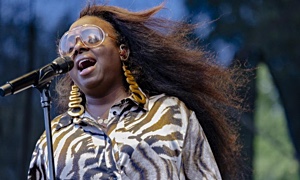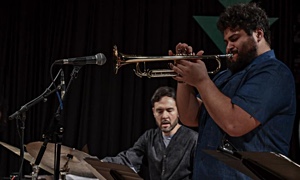Home » Jazz Articles » Big Band Caravan » Jason Hainsworth Big Band / DePaul University Jazz Ensem...
Jason Hainsworth Big Band / DePaul University Jazz Ensemble / Big Band Ritmo Sinfonica Citta di Verona / Howard University Jazz Ensemble
 Jason Hainsworth Jazz Orchestra
Jason Hainsworth Jazz OrchestraKaleidoscope
DW Jazz
2009
On his first turn at bat, composer / arranger / tenor saxophonist Jason Hainsworth has not only slammed one out of the park with Kaleidoscope but has produced a viable entrant in the big-band Record of the Year sweepstakes. The album is comprised of seven songs (three standards, four originals by Hainsworth), and every one is an unequivocal winner.
Hainsworth, a 1992 graduate of Houston's renowned High School for the Performing and Visual Arts who now teaches at Broward College in Fort Lauderdale, FL, traveled to New York City to recruit topnotch sidemen (and women) for his inaugural album. Two of the band's section leaders, alto Sharel Cassity and trumpeter Tanya Darby, are members of the fairer sex, as is bassist Linda Oh, while tenor saxophonists Peter Reardon Anderson and Will Reardon Anderson are either related or two of the most unlikely coincidences in big-band history. Lead trombonist Michael Dease (showcased on the ballad "When I Fall in Love"), who now makes his home in the Big Apple, was a colleague of Hainsworth's a decade ago at Florida State University. And last but not least, Hainsworth lassoed a brace of outstanding guest artists, trumpeter Claudio Roditi and tenor saxophonist Jon Irabagon, each of whom delivers inspired licks on Hainsworth's medium-tempo burner "It's Right There." Roditi solos again (muted) with Hainsworth and pianist Roger Lent on Howard Dietz / Arthur Schwartz's "Alone Together."
Kaleidoscopeopens with the charming Cole Porter perennial "I Concentrate on You" (solos by Cassity, Lent, Oh and drummer Phil Stewart), scored as a Jazz samba in which brass and reeds are given leave to brandish their chops. Following "Right There," "When I Fall in Love" and "Alone Together," Hainsworth ends the session with his originals "Matriarch" (written for his mother, Pat), "Marcelienne" (for his wife) and the requisite blues, "Something Stolen, Something Blue." Tom Barber's burnished flugel is front and center on the waltzing "Matriarch," Hainsworth's glossy tenor on the gentle bossa "Marcelienne," while the Basie-style "Blue" earmarks blowing space for Lent, alto Richard Miller, bass trombonist Max Seigel (using a plunger), baritone Paul Nedzela and tenor Will Reardon Anderson.
While one album does not a career make, Hainsworth has certainly taken an auspicious first step with Kaleidoscope, which is as diverse and rainbow-like as the name implies.
 DePaul University Jazz Ensemble Featuring Mark Colby
DePaul University Jazz Ensemble Featuring Mark ColbyNext Season
DePaul University Jazz
2009
Over the past decade the DePaul University Jazz Ensemble has recorded with such well-known artists as Phil Woods, Clark Terry, Louie Bellson, Tom Harrell, Bob Brookmeyer, Frank Wess and Jim McNeely. On Next Season, director Bob Lark's award-winning ensemble shares the studio with tenor saxophonist Mark Colby, a seasoned pro who isn't known to more than a handful of Jazz enthusiasts outside the Chicago area but certainly should be. With Colby, a Stan Getz acolyte, smoldering on five selections and the DePaul ensemble at the top of its game, Next Season is another in an unbroken series of impressive albums by Lark's clear-eyed and enterprising scholars.
Colby, ably supported by the band, is the main man on Antonio Carlos Jobim's "A Felicidade" and "Desafinado," Wayne Shorter's "Lester Left Town," Phil Woods' "Goodbye, Mr. Evans" and Peter Chatman's "Everyday I Have the Blues," the last featuring the album's only vocal, by debonair tenor Milton Suggs. Colby is at ease in every framework, devising one eloquent phrase after another and making every solo special. And when Colby's not guiding the craft the ensemble is far from rudderless, cruising steadily ahead on the wings of splendid charts by trombonist Dominic Marino (Tadd Dameron's "Lady Bird," Miles Davis / Gil Evans' "Boplicity" and his own composition, "Wrong Place, Wrong Time"), guitarist Mike Pinto's sultry "Via Lyon," faculty member Tom Matta's spacious "Next Season" and his congenial arrangement of the plaintive "Goodbye, Mr. Evans." Pinto arranged "A Felicidade" and "Desafinado," trumpeter Scott Dickinson "Lester Left Town."
As for soloists, DePaul has a stalwart squadron of its own including Pinto ("Desafinado," "Via Lyon"), Dickinson ("Lester Left Town," "Wrong Place"), Marino ("Next Season"), flugel Joe Clark ("Mr. Evans"), alto Nick Mazzarella ("Wrong Place"), vibraphonist Justin Thomas ("Boplicity") and tenors Dan Nicholson ("Lady Bird," "Next Season") and Drew Pierson ("Via Lyon"). Even so, they are hard-pressed to outflank the ensemble, which aces every assignment with awareness and animation.
With Lark in charge, one may rest assured that Next Season and every season thereafter will be admirable and productive. Add Mark Colby's sublime tenor, and this Season is especially rewarding.
 Big Band Ritmo Sinfonica Citta di Verona
Big Band Ritmo Sinfonica Citta di VeronaRestless Spirits: The Music of Roberto Magris
Flame Boy
2009
Having previously heard Italian composer / arranger / pianist Roberto Magris only in small-group settings, it's gratifying to encounter his music for larger ensembles as performed on Restless Spirits by the Big Band Ritmo Sinfonica Citta di Verona. I don't read or speak Italian but presume the "Ritmo" stands for "rhythm," something the band (and Magris' charts) have in abundance, whatever the mood or tempo.
Big Band Ritmo is a forty-three piece orchestra with strings, augmented on seven tracks each by special guest artists, trumpeter Massimo Greco and percussionist Sbibu. Magris plays acoustic piano on four selections, Fender Rhodes on the other five. Magris and Greco share much of the blowing space (an unnamed trombonist stretches out on "African Mood." soprano saxophonist Giovanna Bissoli on "Maliblues"), and Greco is an engaging soloist on flugelhorn ("Blues for My Sleeping Baby," "Standard Life") or trumpet. Magris, meanwhile, uses his elegant touch and harmonic awareness to good advantage throughout.
Two pianos introduce the pulsating "Restless Spirits," on which Magris is listed as playing Fender Rhodes. Sbibu is at his best here, urging the spirits onward with his unremitting percussive by-play. He's also front and center on the spirited "Standard Life," providing a secure rhythmic backdrop for Greco's soaring flugel and Magris' expressive piano. As noted, Magris composed every number and arranged all save "Restless Spirits" (adapted by Gino Farenzena) and the ballad "Peaceful Heart" (Marco Pasetto). The picturesque "African Mood," a charming opener, is followed by the equally enticing "Sleeping Baby." The studio date closes with an alternate take of "Ambiguous," increasing the album's playing time to almost seventy minutes.
On Restless Spirits, Magris proves he is as proficient writing for a big band as he is for trios or quartets. He and the Big Band Ritmo Sinfonica Citta di Verona have designed an impressive album that is unlike any others you're apt to chance upon.
 Howard University Jazz Ensemble
Howard University Jazz EnsembleHUJE 2008
HUJE Jazz
2009
Every year since 1975, Fred Irby III, director of the acclaimed Howard University Jazz Ensemble, has ushered the ensemble into a recording studio to produce a musical snapshot of its prowess. Every year, Irby's charges have risen stoutly to the challenge, creating one impressive album after another—and HUJE 2008 is definitely no exception. As always, highlights abound, but pride of place must go to the ensemble's hard-working sax section, which emphatically nails Charlie Young's mind-blowing arrangement of Cole Porter's "Easy to Love," an adaptation for big band of one of Cannonball Adderley's remarkably nimble-fingered solos. The sort of electrifying performance that would merit enthusiastic applause even from SuperSax.
Teaming with the ensemble, as it has for the past half-dozen years, is director Connaitre Miller's nine-member a cappella vocal group Afro Blue, which is heard on the Mack Gordon / Harry Warren standard "There Will Never Be Another You" and James Weldon Johnson's inspiring anthem, "Lift Ev'ry Voice and Sing." There are two more vocals, by winsome Christie Nicole Dashiell on Lieber / Stoller's "I'm a Woman" and Jimmy Owens' ardent "Martin's Theme" (dedicated to the Rev. Martin Luther King Jr.).
Mike Crotty, former chief arranger for the USAF's Airmen of Note, scored Johnny Mandel's succulent "Cinnamon and Clove" and Billy Strayhorn's sensuous "Passion Flower," the first showcasing pianist Jerrol Pennerman and alto saxophonist John Kocur who frame an eloquent encore, with Kocur on soprano, on Gene Thorne's cogent finale, "Prelude to Summer." Kocur is spotlighted on "Passion Flower," tenor Brian Settles on Benny Carter's "People Time" (arranged by Scott Silbert). Settles and Pennerman are superb on "Walkin' My Baby Back Home," as are Pennerman and tenor Joshua Carr on Rob Lussier's tasteful arrangement of the standard "You Stepped Out of a Dream."
Another year, and yet another scintillating album by the first-rate Howard University Jazz Ensemble and Afro Blue. In these unsettled and unsettling times, it's comforting to know that some things remain the same no matter how perplexing the course of human events.
 Mace Francis Orchestra
Mace Francis OrchestraNeverever . . . Well, Maybe Someday
Little Louie Records
2009
Neverever . . . is the fourth album by the Mace Francis Orchestra Orchestra from far-off Perth, Australia, the second recorded in front of an audience, this time in July 2008 at the Sound Lounge in Sydney. As on his earlier ventures, Francis and his mates are on the one hand earnestly forward-looking, and on the other securely anchored in Jazz and big-band orthodoxy.
The upshot is music that can be taut and swinging but has more in common with Maria Schneider, Bob Brookmeyer, Gil Evans, Carla Bley and other pace-setters than to such square-shooters as Sammy Nestico, Neal Hefti, Ernie Wilkins, Marty Paich, Bob Florence or even Bill Holman. The ensemble's elaborate charts aren't for the faint of heart or for those whose vigilance is less than unwavering. In other words, these are not tunes that one is likely to leave the concert humming. Francis wrote and arranged four of the nine selections, saxophonist Daniel Thorne three, trombonist Tilman Robinson the other two.
The album opens with Thorne's rhythmic, chorale-like "Neverever" and closes with his even-tempered "Over and Over and Over." Sandwiched between are Francis' "Pine Tree Blisters," Thorne's "What About Jed?" (featuring guitarist Tim Jago), Francis' "Well . . . Maybe Someday," Robinson's "Thinking Without Thinking" and "Where Can I Park My Fist?," another question from Francis ("Where's His Sepcin?") and his throbbing "Jelly Belly." Solos are by and large in the capable hands of Jago, alto Ben Collins, tenors Thorne and Alistair McEvoy, trumpeter Callum G'Froerer and trombonist Percy James Landers. Landers, McEvoy, Thorne and baritone Mark Sprogowski strengthen the orchestra's already-powerful "Fist."
As it rests somewhere between exploratory and well-grounded, Neverever . . . doubtless won't please everyone's musical palate. Gourmets may find it appetizing, others less so. The basic ingredients—melody, harmony, rhythm—are firmly in place, and the orchestra does swing, albeit randomly. As we wrote of Francis in reviewing an earlier album, "The young composer and his orchestra are clearly filling a need for thought-provoking contemporary Jazz in western Australia, and we wish them prosperity and good health."
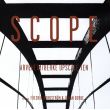 Arveheim / Berke Upscale Ten
Arveheim / Berke Upscale TenScope
Phono Suecia
2009
The Stockholm-based Arveheim / Berke Upscale Ten is actually two groups in one: guitarist Johan Berke's Upstairs Five and a brass quintet led by trombonist / tubaist Mattias Arveheim, with compositions and arrangements on Scope by Berke and saxophonist Fredrik Nordstrom.
The music is decidedly modernist, opening with a trio of forward-leaning tone poems by Nordstrom and closing with Berke's forty-minute "Suite No. 1 for Ten Musicians." Nordstrom describes the alliance as "creative and exciting," Arveheim as "challenging." The last would certainly apply, as the various themes call for compendious musical proficiency. Having said that, one must concede that these vignettes are more cerebral than swinging, more cryptic than candid. There are, in fact, times (such as on "Rust-Red") when the music, to these ears, meanders close to irksome.
For the most part, however, this is simply avant-garde Jazz with a taciturn Swedish veneer. There are a number solos but none that inscribes a lasting impression. The improvisations arise naturally from within the group dynamic and are apparently faithful to the composers' broader purpose. Aside from that, there's not much to say about them. The compositions / arrangements tread a similar path in that they are consistently decorous while emphatically removed from memorable. Scope seems primarily aimed toward listeners whose ears are inured to exotic frameworks that stimulate the intellect while leaving the emotions relatively unscathed.
 Jentsch Group Large
Jentsch Group LargeCycles Suite
Fleur de Son Records
2009
Based on his first four recordings, one might reasonably suspect that guitarist Chris Jentsch has a "suite" tooth. On the heels of his well-received Brooklyn Suite and earlier Miami Suite, Jentsch and his New York-based Group Large have reappeared to introduce his Cycles Suite, designed, in his words, "as a meditation on one's own life cycle and the important connections with the cycles of others."
The expansive series is divided into half a dozen more tenable episodes: "Arrival," "Cycle of Life," "Home and Away," "Old Folks Song," "Route 666" and "Departure." As on Brooklyn, Jentsch employs a broad range of musical styles from Jazz to rock, world to classical, blues to ballads, appending sound effects whenever appropriate to suit his purpose. If there's an adjective that best describes Jentsch's music, it could well be "sedate." While there are brief exceptions, most notably on "Route 666," Cycles is, by and large, steadfastly low-key.
The opening movement, "Arrival," one of the two briefest at 5:16 ("Departure" runs 5:46), evolves slowly, almost esoterically, with various nature-like sounds preceding its Mingus-inspired theme and plain-spoken solo by trombonist Brian Drye that evolve seamlessly into "Cycle of Life," another placid theme encompassing a spiraling solo by either Ben Kono or Jason Rigby on clarinet and a group discourse by Jentsch, tenor Mike McGinnis, trumpeter Mike Kaupa and trombonist Jacob Garchik. Again, the special effects, devised, one assumes, to exemplify the sounds of nature, are ever-present.
"Home and Away" offers basically more of the same, its graceful melody ushered in by the rhythm section to enhance compliant solos by Rigby (on alto) and trumpeters Kaupa and John Carlson. "Old Folks Song" saunters along in a similarly temperate vein behind apposite statements by Jentsch, Kaupa and drummer John Mettam. "Route 666," as noted, generates some heat to inflame solos by Jentsch, Kaupa and Dan Willis' strident tenor before Jentsch renews the Mingus theme on "Departure," once again showcasing Drye's supple trombone, this time muted.
Even though coherent and well-planned, Jentsch's Cycles Suite may be "suiter" to some ears than to others, more than likely to those who are indispensably attuned to contemporary as opposed to customary big-band Jazz. It is recommended warmly to them, while those who relish Basie, Kenton, Herman and their kindred are advised to look elsewhere.
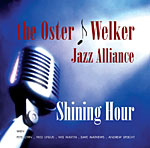 The Oster / Welker Jazz Alliance
The Oster / Welker Jazz AllianceShining Hour
Jazzed Media
2009
Shining Hour backed uneasily into this space in spite of the fact that it isn't really a big-band session. Jeff Oster, who sings on every number, is backed by groups ranging in size from tentet to trio (and by guitarist Ron Vincent alone on "Young and Foolish") with all the arrangements by trumpeter Peter Welker.
The result is on the whole pleasant enough but this listener found himself paying more heed to the charts and soloists than to Oster, not an auspicious sign for what is essentially a vocal showcase. That's not to imply that Oster is less than capable; the stumbling block, to these ears, is that he is no more than that. Scott Yanow, in his liner notes, says Oster's voice "has been compared to Mel Torme, and I can hear a bit of Chet Baker in his sound." I can hear neither. His amiable tenor sounds entirely like Jeff Oster, as does his phrasing. Not that there's anything wrong with that.
The choice of material is generally pleasing, with tracks 7-10 comprising four of this reviewer's best-loved songs: "Young and Foolish," "Speak Low," "My Shining Hour" and "My Foolish Heart." Dizzy's "Groovin' High" and Toots Thielemans' "Bluesette" are also admirable, easily outdistancing Ronnell Bright's "Sweet Pumpkin," Leon Russell's "This Masquerade" and Oster's lone original, "Bean" (sans lyric, only scat).
In the end, however, it is Welker's evocative charts that earn one's unreserved applause, along with eloquent solos by altos Andrew Speight, Jim Rothermel and Fred Lipsius (who adds a handsome piano solo on "My Foolish Heart"); tenors Roberts Brothers, Scott Petersen and Mel Martin; pianists Lipsius, Matt Clark and Dave Mathews; guitarist Vincent, bassist Chris Amberger and drummer Kevin Dillon. Welker solos once, on flugelhorn, on Johnny Mandel's "A Time for Love." Others may find Oster's vocals more congenial, in which case they would certainly deem this a Shining Hour worth spending in his company.
Tracks and Personnel
Kaleidoscope
Tracks: I Concentrate on You; It's Right There; When I Fall in Love; Alone Together; Matriarch; Marchienne; Something Stolen, Something Blue.
Personnel: Jason Hainsworth: composer, arranger, conductor, tenor sax; Tanya Darby, Dave Smith, Chris Winans, Alex Nguyen: trumpet; Thomas Barber: trumpet, flugelhorn; Sharel Cassity, Richard Miller: alto sax, flute; Peter Reardon Anderson, Will Reardon Anderson: tenor sax; Paul Nedzela, Frank Basile: baritone sax; Michael Dease, Joe McDonough, Robert Edwards: trombone; Max Seigel: bass trombone; Roger Lent: piano; Linda Oh: bass; Phil Stewart: drums. Special guests: Claudio Roditi: trumpet and flugelhorn (2, 4); Jon Irabagon: tenor sax (2).
Next Season
Tracks: A Felicidade; Every Day I Have the Blues; Desafinado; Lady Bird; Lester Left Town; Via Lyon; Wrong Place, Wrong Time; Goodbye, Mr. Evans; Boplicity; Next Season.
Personnel: Bob Lark: director; Ethan Bulak, Joe Clark, Ryan Adamsons, Scott Dickinson, Chris Clark: trumpet, flugelhorn; Nick Mazzarella: alto, soprano sax; Matt Zimmermann: alto sax, flute; Dan Nicholson: tenor sax, flute; Drew Pierson: tenor sax, clarinet; Steve Schnall: baritone sax, bass clarinet; Bryan Tipps, Dominic Marino, Andrew Hamilton: trombone; Jared Lantzy: bass trombone; Scott Williams: piano; Mike Pinto: guitar; Justin Thomas: vibraphone; Chris Clemente: bass; Lawrence Haskin: drums; Milton Suggs: vocal (2). Guest artist: Mark Colby: tenor sax (1-3, 5, 8).
Restless Spirits
Tracks: African Mood; Blues for My Sleeping Baby; Peaceful Heart; Ambiguous; Restless Spirit; Short and Shorter; Standard Life; Maliblues.
Personnel: Roberto Magris: composer, arranger, piano (1, 3, 7, 8), Fender Rhodes (2, 4-6, 9); Marco Pasetto: music director, conductor, soprano sax (8); Matteo Costanzi, Giorgio Fiorini, Davide Gagliardo, Sandro Gilioli, Marco Sorio: trumpet; Giovanna Bissoli: soprano sax; Emanuele Ballini, Paolo Girardi, Paolo Presenti: alto sax; Orazio Boscagin, Stefano Buttura: tenor sax; Sandro Avesani: baritone sax; Saulo Agostini, Linda Anzolin, Gino Farenzena, Giorgio Morelato, Giordano Bruno Tedeschi: trombone; Patrizia Ballardini, Franco Lissandrini, Beatrice Maistri, Barbara Mazzon, Giulia Realdini, Elena Zavarise: flute; Filippo Borgo, Caterina Gatto, Elisabetta Grego, Alessandro Manfredi, Nicola Zeggio: clarinet; Paolo Delaini, Marco Finato: bass clarinet; Ester Anzolin, Denis Cavallini, Graziana Marchioni, Marco Pallaver: horn; Mario Cracco: tuba; Anna Vittoria Zanardi: fagotto; Ivo Bonazzi: guitar; Giuseppe Gasparini: electric bass; Daniele Rotunno: tastiere; Giorgio Buttura: glockenspiel; Stefano Zuffellato: drums; Stefano Zambolin: percussion. Special guests: Massimo Greco: trumpet (3, 4-6, 9), flugelhorn (2, 7); Sbibu: percussion (1, 3-5, 7-9).
HUJE 2008
Tracks: Cinnamon and Clove; Passion Flower; There Will Never Be Another You; Easy to Love; People Time; I'm a Woman; Walkin' My Baby Back Home; Martin's Theme; Lift Ev'ry Voice and Sing; You Stepped Out of a Dream; Prelude to Summer.
Personnel: HU Jazz Ensemble—Fred Irby III: director; Rashid Hughes, Norberto Mejicanos, Wesley Meyer, Malcolm Stokes, Danielle Ashton: trumpet, flugelhorn; John Kocur, alto, soprano sax; Brent Birckhead: alto sax; Brian Settles, Joshua Carr: tenor sax; Isaiah Allen: baritone sax; Paul Phifer, Richard Milburn, Timothy Johnson: trombone; Matthew Caraballo: bass trombone; Jerrol Pennerman: piano; James Rodney Richardson: electric guitar; Jarrin Moore: electric bass; Carroll V. Dashiell III: drums, percussion; Reginald Johnson: percussion; Christie Nicole Dashiell: vocals. Afro Blue—Connaitre Miller: director; Danielle Withers, Tonya Khakazi, Rachel Robinson: soprano; Jessica Chambliss: soprano, alto; Christie Dashiell, Brandi Pace: alto; Micah Robinson: tenor; Reginald Bowens: baritone; Brian Lawson: bass.
Neverever . . . Well, Maybe Someday
Tracks: Neverever; Pine Tree Blisters; What About Jed?; Well . . . Maybe Someday; Thinking Without Thinking; Where Can I Park My Fist?; Where's His Sepcin?; Jelly Belly; Over and Over and Over.
Personnel: Mace Francis: composer, arranger, conductor; Ricki Malet, Callum G'Froerer, Brendan Baker: trumpet; Ben Collins, Daniel Thorne, Alistair McEvoy, Mark Sprogowski: reeds; Percy James Landers, Robin Murray, Tilman Robinson: trombone; Tim Jago: guitar; Wayne Slater: bass; Greg Brenton: drums.
Scope
Tracks: Medium Blue; Light Grey (Partly Cloudy); Rust-Red; Suite No. 1 for Ten Musicians (Sometimes / I Wonder / Where / Do We Go / From Here).
Personnel: Fredrik Nordstrom: composer, arranger, alto, tenor sax; Johan Berke: co-leader, composer, arranger, electric and 12-string acoustic guitar; Mattias Arveheim: co-leader, bass trombone, tuba; Ronny Farsund, Nils Janson: trumpet, flugelhorn; Johan Ahlin: French horn; Orjan Hulten: soprano, tenor sax; Anders Norell: trombone; Filip Augustson: bass; Fredrik Rundqvist: drums.
Cycles Suite
Tracks: Arrival; Cycle of Life; Home and Away; Old Folk Song; Route 666; Departure.
Personnel: Chris Jentsch: leader, composer, guitar; Darcy James Argue: conductor; Jon Owens, John Carlson, Mike Kaupa, Laurie Frink: trumpet; Ben Kono, Jason Rigby, Mike McGinnis, Dan Willis, Josh Sinton: reeds; Alan Ferber, Brian Drye, Jacob Garchik, Max Seigel: trombone; Jacob Sacks: piano; Jim Whitney: bass; John Mettam: drums.
Shining Hour
Tracks: Sweet Pumpkin; Sophisticated Lady; This Masquerade; Laura; Keep Going Back to Joe's; "Bean"; Young and Foolish; Speak Low; My Shining Hour; My Foolish Heart; Groovin' High; Bluesette; A Time for Love.
Personnel (collective): Jeff Oster: vocals; Peter Welker: arranger, trumpet, flugelhorn; Michael Whitwell: trumpet, flugelhorn; Fred Lipsius: alto sax, piano; Andrew Speight, Jim Rothermel: alto sax; Mel Martin, Rob Roth: tenor sax; Scott Petersen: tenor, baritone sax; Johnny Bamont: baritone sax; Pete Levin: piano, string synth, Hammond B3 organ; Dave Mathews, Matt Clark: piano; Randy Vincent: guitar; Chris Amberger: bass; Kevin Dillon: drums; Louis Romero: percussion.
Tags
PREVIOUS / NEXT
Support All About Jazz
 All About Jazz has been a pillar of jazz since 1995, championing it as an art form and, more importantly, supporting the musicians who make it. Our enduring commitment has made "AAJ" one of the most culturally important websites of its kind, read by hundreds of thousands of fans, musicians and industry figures every month.
All About Jazz has been a pillar of jazz since 1995, championing it as an art form and, more importantly, supporting the musicians who make it. Our enduring commitment has made "AAJ" one of the most culturally important websites of its kind, read by hundreds of thousands of fans, musicians and industry figures every month.



